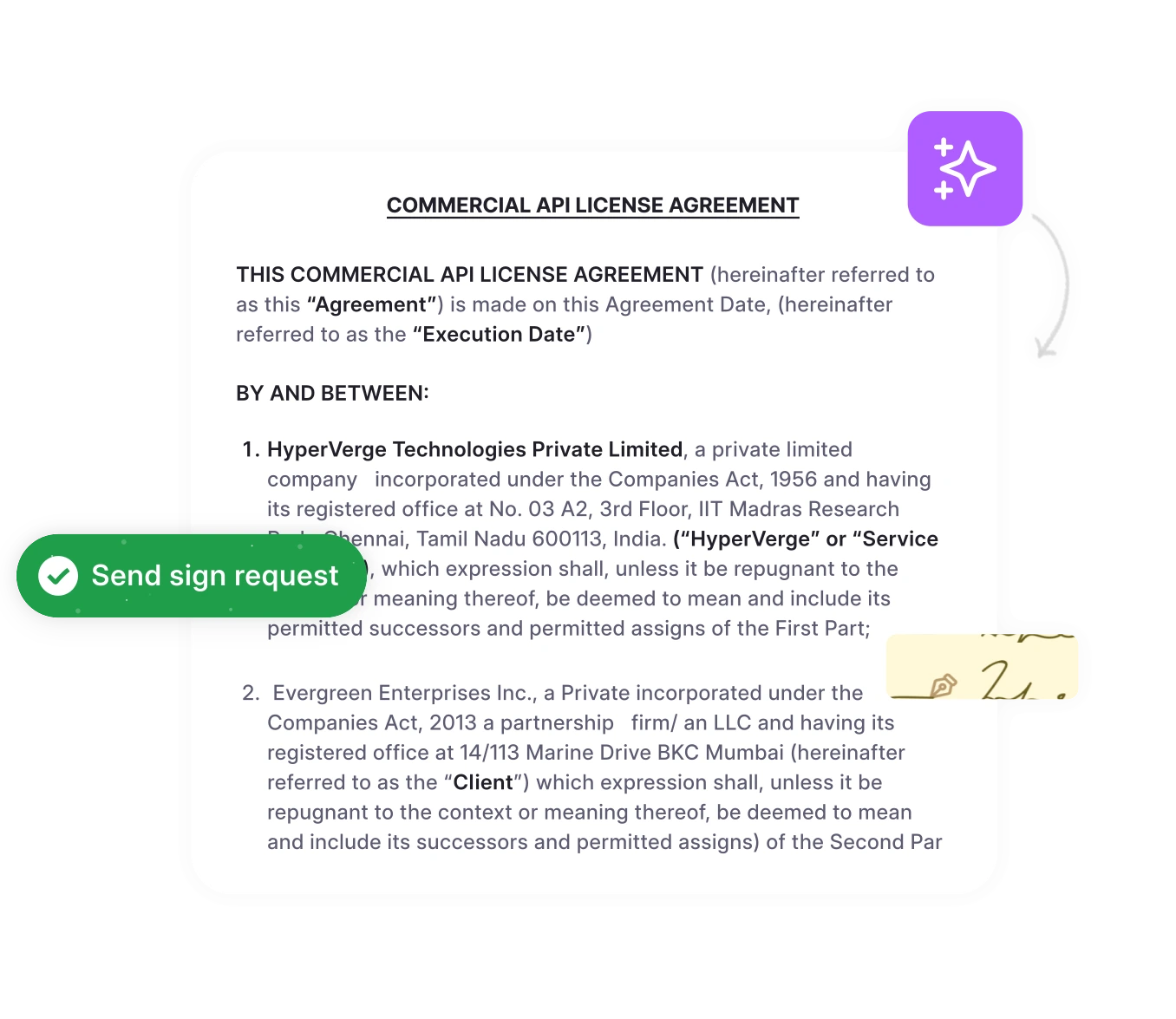Maintaining the best contract performance is essential for CLM and business efficiency. Monitoring contracts is the key to checking contract performance, realizing discrepancies in contracting goals, and minimizing risks.
Contract monitoring helps answer questions like:
How well are our contracts performing?
Are there any unaddressed contract risks?
Do all contracts comply with agreed legal norms?
Are there any unfulfilled contract obligations or milestones?
Is there anything room for improving contract management?
In case you too have these questions, you are at the right place. This blog post covers detailed information on monitoring contracts.
Learn why it is important to monitor contracts and the best way to monitor contracts. Let’s start.
What is contract monitoring?
Contract monitoring (also known as contract oversight) is the process of tracking contract performance and compliance. Monitoring contracts ensures contracts are working as expected and whether or not the contracting parties are adhering to the agreed terms.
During the contract monitoring process, contract managers and compliance officers review the contract and measure its performance against certain pre-defined metrics, such as compliance rates and execution progress.
Continuously monitoring agreements enables organizations to identify and mitigate risks early. However, there’s more to why you should monitor contracts which we will cover next.
Why should contracts be monitored?
“How does monitoring signed contracts benefit our organization?” If this is your concern as well, know that monitoring is the key to improving contract management and boosting contract performance. Here are 5 key benefits of contract monitoring:
1. Enhances contract compliance
As per a Globalscape report, non-compliance costs organizations $4,005,116 in revenue losses. Most of these losses are in terms of fines, penalties, and legal charges arising from non-compliance lawsuits.
Monitoring helps ensure that your organization is on track with legal and regulatory compliance requirements as agreed to in the contract. It gives the needed contract visibility to maintain contract performance and correct non-compliance issues before they become breaches and penalties.
2. Improves risk visibility and management
Not monitoring contracts leads to ignored risks. Poor risk knowledge results in unforeseen non-compliance issues and contract breaches. Overall, by not monitoring your contract portfolio, you are not only increasing your risk exposure but also neglecting risks.
On the other hand, continuously monitoring contracts gives organizations prior knowledge of rising risks, providing grounds for effective contract risk management and mitigation. With continuous monitoring, you can ensure alignment between business processes and contractual objectives, significantly reducing risks.
3. Elevates operational efficiency
CLM bottlenecks and hurdles delay operations. Be it a delay in contract signing due to the signatory’s unavailability or lengthy negotiation cycles, contract delays are a major root cause of operational delays.
With real-time contract performance monitoring, organizations can realize contract bottlenecks and eliminate them. Monitoring helps identify and optimize inefficient CLM processes, which in turn helps accelerate contract execution and streamline business operations.
4. Helps track contract performance
Contract performance is often neglected due to untracked KPIs and a lack of visibility in contractual performance. Without clear tracking, organizations face challenges in identifying underperformance, managing compliance, and addressing issues in real time.
Contract oversight addresses these problems by providing continuous information on contractual key performance indicators. Proactively managing contract performance helps find key areas of improvement like contract TAT, signing time, and review cycles.
5. Improves business relations with counterparties
Lack of accountability and traceability in agreements can hamper business relations between contract parties. Moreover, when obligations, terms, and commitments are not monitored for fulfillment and compliance, contract breaches and violations arise. This leads to terminations and soured relations with counterparties.
Monitoring helps ensure that all the contracting parties are aware of contractual progress per agreed-upon terms. With a clear overview of contractual obligations and commitments, both parties involved in the deal can maintain communication transparency and improve collaboration—ultimately improving the contract’s success chances.
Gain Full Contract Visibility
Switch to HyperStart CLM—the AI-powered platform for smart contract monitoring. Get real-time insights and better visibility.
Contract oversight is the key to better contract management. But, who is responsible for monitoring contracts? The coming section answers this question.
Who is responsible for monitoring agreements?
Monitoring contracts is an organization-wide responsibility. Different individuals monitor different parts of the agreement that are relevant to their processes, objectives, and operations. These individuals are:
Legal teams: Legal professionals, in-house attorneys, and lawyers must know about potential legal risks, due to which they monitor contracts closely.
Contract managers: Contract managers are responsible for the smooth functioning of the contract lifecycle, making them key individuals in monitoring contract performance.
Compliance officer: Compliance with legal and obligatory terms is essential for smooth operations. Compliance officers monitor agreements to track and ensure compliance and adherence.
Risk management officer: Risk management and mitigation teams leverage monitoring data to identify potential contract risks and plan mitigation strategies.
Therefore, different teams have different roles in overseeing contracts. However, how do business teams monitor contracts? The coming section sheds light on the monitoring process.
What is the process of monitoring contracts?
Here’s the 7-step contract monitoring procedure for monitoring contracts.. Following these steps ensures on-point agreement analysis and monitoring.
Step 1: Assess your contract portfolio
Review contract types: Identify active contracts, types, and their business importance.
Categorize contracts: Group similar contracts to streamline monitoring (e.g., by department, vendor, or value).
Identify risk-prone contracts: Prioritize monitoring for contracts with high-risk or complex terms.
Step 2: Identify what needs to be monitored
Define key monitoring areas: Determine which aspects (compliance, deadlines, KPIs) are most crucial for monitoring.
Identify critical obligations: Determine obligations that significantly impact business goals or carry penalties.
Step 3: Allocate responsibilities and duties
Assign ownership: Designate specific team members and points of contact for contract oversight and issue management.
Establish accountability: Ensure each person understands their role in the monitoring process.
Step 4: Establish key performance indicators (KPIs)
Identify metrics: Choose specific contract lifecycle management metrics relevant to your business and contracting objectives.
Set measurable targets: Establish clear and achievable targets for each KPI, ensuring that the targets are agreed on by responsible teams.
Use historical data: Leverage data from previous contract performance to identify areas of improvement, set KPIs, and forecast results.
Step 5: Report on contract performance
Create reporting templates: Standardize contract management reporting through pre-fixed templates, covering critical reporting metrics and data points.
Automate reporting: Use a contract management platform to automate the reporting process and generate real-time reports and analytical insights.
Step 6: Review reports and plan risk mitigation
Analyze reporting data: Look for patterns of underperformance, compliance gaps, risks, or delays. Identify what matches the KPIs and what doesn’t.
Develop a risk response plan: Create a risk management and mitigation strategy for non-compliant and risky agreements to prevent risk mismanagement.
Prioritize high-risk contracts: Allocate resources to address contracts posing the greatest risks.
Step 7: Evaluate overall performance and collect feedback
Review end-to-end performance: Assess how well each contract met its KPIs and overall expectations.
Compare with historical data: Leverage historical data to compare previous performance with current performance and find improvements and gaps.
Collect internal and external feedback: Reach out to internal stakeholders and counterparties for feedback on the contract experience.
Develop an improvement plan: Use feedback to refine future contract management and monitoring strategies.
Automate Contract Monitoring With AI
HyperStart CLM helps monitor contracts with the highest accuracy and zero manual effort. Get CLM insights with drillable dashboards.
Combining this contract monitoring process with your contract lifecycle management practices ensures you get the most from your contract portfolio. Along with these steps, there are certain best practices you can integrate for effective monitoring of agreements.
5 best practices for monitoring contracts
Here are 5 contract monitoring best practices to help you oversee agreements without missing out on important details:
- Centralize the contract portfolio for better data sharing: A centralized contract repository makes it easy for all teams to access contract data at any time from anywhere. All relevant stakeholders can monitor metrics relevant to their processes.
- Automate monitoring with contract monitoring tools: Some of the top contract automation platforms like HyperStart CLM help auto-monitor contracts and report on performance using AI.
- Monitor contracts based on data priority and risks: High-value and high-stake contracts should be prioritized due to their critical nature. This approach minimizes the chances of contract breaches with high-value deals.
- Combine monitoring with tracking for better contract visibility: Tracking is related to obligations and milestones, which are directly correlated to monitoring contract compliance. Merging the two is important for CLM efficiency.
- Conduct continuous feedback during monitoring: Continuously track and report on performance tracking data, metrics, KPIs, issues, risks, and non-compliance information. This helps manage risks in real time.
Monitor contracts smartly with HyperStart’s AI
With a large contract portfolio of critical agreements, monitoring contracts can be tricky. There are always chances of mistakes and negligence. HyperStart CLM helps ensure accurate and effortless contract monitoring with artificial intelligence.
HyperStart CLM enables you to turn your complete agreement portfolio into an insight dashboard through our comprehensive contract monitoring system. With ongoing monitoring, compliance checks, obligation tracking, and alerts, HyperStart CLM helps ensure you never miss out on critical details ever again.
Our contract AI technology eliminates manual monitoring efforts, giving you the needed insights with zero hassle.
Book a demo with HyperStart CLM today to identify unique use cases of this platform in your contract management processes.











